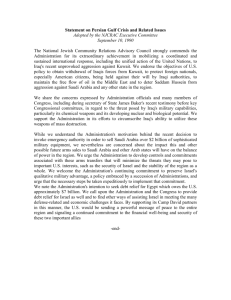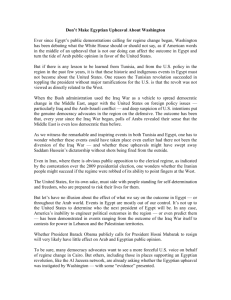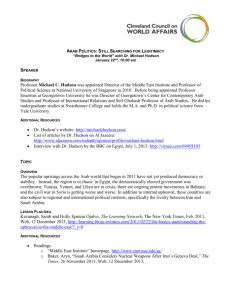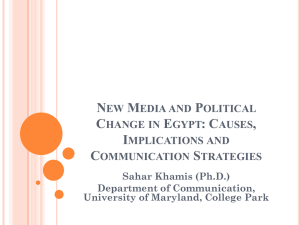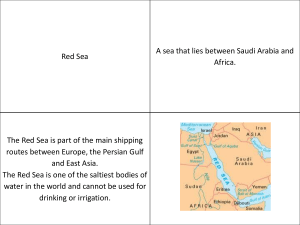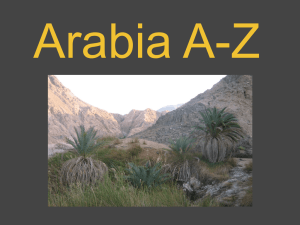The Arab Spring
advertisement
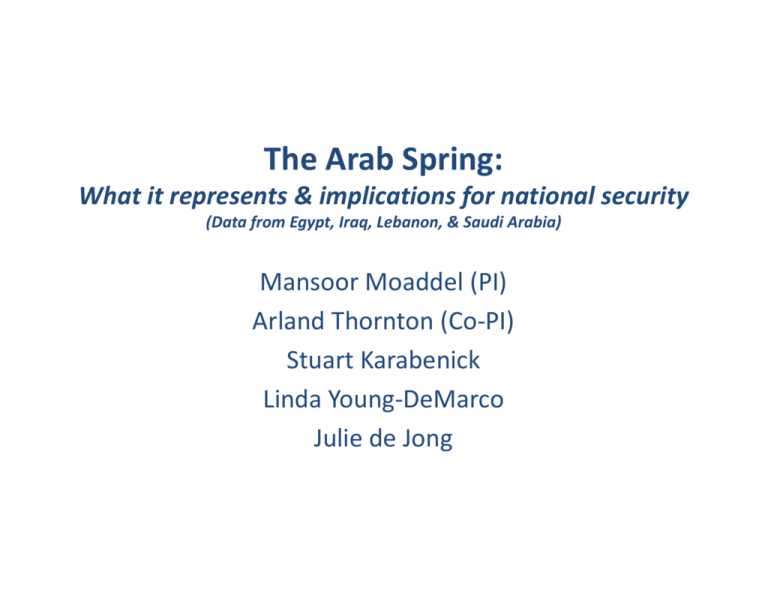
The Arab Spring: What it represents & implications for national security (Data from Egypt, Iraq, Lebanon, & Saudi Arabia) Mansoor Moaddel (PI) Arland Thornton (Co-PI) Stuart Karabenick Linda Young-DeMarco Julie de Jong The Arab Spring: What it represents & implications for national security (Data from Egypt, Iraq, Lebanon, & Saudi Arabia) • • • • • • • Overview The Arab Spring as a departure from extremism: Non-ideological movements for democracy & economic prosperity The Internet as an ideologically-neutral organizing tool A shift in people’s political and cultural values Who participated in the Arab Spring? Westernization, democracy, equality, & economic prosperity Interest in Western technology Positive implications for national security: (1) The Arab Spring’s focus on freedom and democracy counters tendencies toward political violence (2) Positive attitudes toward Westernization and Western technology provide a basis for constructive dialog with the Arab public Data Collection Methods Face-to-face interviews with nationallyrepresentative samples Survey Field Period Egypt June – August 2011 Iraq January – February 2011 Lebanon March – July 2011 Saudi Arabia January – February 2011 Survey questionnaire available: http://mevs.org/data/survey-summary/1004 Sample Size 3,496 3,000 3,034 2,005 People’s Explanations for the Arab Spring: Movements for democracy & economic prosperity % reporting main reason for the Arab Spring 70% 60% 59% 51% 50% 40% 30% 25% 20% 15% 9% 10% 10% 9% 2% 9% 2% 3% 4% 0% Freedom & democracy Economic equality & prosperity Islamic government Egypt Counter Western Part of a Western influence conspiracy Lebanon Arab unity %Relying on Satellite TV, Internet, or Mobile as Sources of Information 80% 74% 69% 70% 62% 60% 50% 49% 49% 40% 30% 28% 20% 14% 14% 10% 10% 0% Egypt Iraq Satellite TV Internet Saudi Arabia Mobile Trends in values among Egyptians, Iraqis, and Saudis National Identity Which one of the following best describes you? 1. I am an Egyptian, Iraqi, Saudi, above all 2. I am a Muslim, above all 3. I am an Arab, above all 4. I am a Kurd, above all 5. Other Egypt: % Expressing “I am an Egyptian, Muslim, or Arab, above all” 90% 81% 80% 70% 60% 50% 50% 48% 40% 30% 20% 10% 8% 1% 2% 0% Above all, Egyptian Above all, Muslim 2001 2011 Above all, Arab Iraq: % Expressing “I am Iraqi, above all” 70% 63% 59% 60% 57% 56% 50% 40% 32% 30% 23% 20% 10% 0% Dec.-2004 Apr.-2006 Mar.-2007 Jul.-2007 Dec.-2008 Jan.-2011 Saudi Arabia: % Expressing “I Am Saudi, Muslim, or Arab, above all” 100% 90% 80% 75% 70% 60% 46% 50% 44% 40% 30% 20% 17% 9% 10% 8% 0% Saudi, above all Muslim, above all 2003 2011 Arab, above all Trends in values Religion & Politics Is it very important, important, somewhat important, not important, or not at all important for a good government to 1.Implement only the Shari'a law? 2.Implement only the wishes of the people? Egyptian Muslims: People’s Wishes Versus the Shari’a 70% 64% 60% 50% 48% 40% 31% 28% 30% 20% 10% 0% Shari'a law Laws according to the people's wishes 2001 2011 Egypt: Which is better in a politician? Strong religious beliefs or strong commitment to national interests(2011) 90% 78% 80% 70% 60% 50% 40% 30% 22% 20% 10% 0% Strong religious beliefs Strong commitment to national interests Iraq: % Agree that Iraq would be a better place if religion and politics are separated 80% 70% 69% Dec.-2008 Jan.-2011 60% 60% 50% 70% 55% 50% 40% 30% 20% 10% 0% Dec.-2004 Apr.-2006 Oct.-2006 Saudi Arabia: Decline in support for the Shari’a & in trust of religious institutions 90% 84% 80% 70% 69% 60% 50% 46% 40% 31% 30% 20% 10% 0% Shari'a law very important Trusting religious institutions a great deal 2003 2011 Egypt: Democracy vs. Strong head of gov’t (% Strongly agree) 90% 84% 79% 80% 70% 68% 60% 50% 40% 30% 20% 9% 10% 2% 5% 0% Democratic political system 2001 Strong head of government 2008 2011 Iraq: % Strongly agree that form of government is good 70% 60% 59% 55% 53% 50% 40% 30% 30% 22% 20% 15% 11% 11% 12% 10% 5% 6% 0% Democracy Islamic government 2004 Apr-06 Strong head of government 2011 Army rule 7% Saudi Arabia: Democracy as the best form of government (% agree) 80% 71% 70% 60% 58% 50% 40% 30% 20% 10% 0% 2003 2011 Trends in values Attitudes toward gender equality 1. A wife must always obey her husband. 2. Men make better political leaders than women do. 3. University education is more important for boys than it is for girls. Egyptian Muslims: Increase in support for gender inequality 80% 68% 70% 60% 60% 50% 55% 47% 40% 30% 21% 20% 16% 10% 0% Wife must always obey her husband Men make better political leaders 2000 2011 University education is more important for boys Iraq: Decline in support for gender inequality (% Strongly agree) 80% 71% 70% 64% 69% 63% 60% 50% 42% 40% 33% 29% 30% 25% 20% 8% 10% 0% A wife should always obey her husband Men make better political leaders 2004 2006 2011 University education is more important for boys Saudi Arabia: Decline in support for gender inequality (% Strongly agree) 70% 61% 60% 53% 50% 44% 44% 40% 30% 20% 10% 0% Men make better political leaders A wife must always obey her husband 2003 2011 Egyptian Muslims: Correlates of protest participations (Correlation coefficients) .30 .25 .25 .25 .20 .20 .15 .17 .14 .15 .18 .16 .13 .11 .10 .05 .00 .11 Egypt: Increased Westernization is tied to increased gender equality, democracy, and overall standard of living 100% 90% 93% 95% Democracy The overall standard of living 90% 80% 70% 60% 50% 40% 30% 20% 10% 0% Equality between women & men COUNTRY Would Be Better with Technology of the West (2011) 100% 90% 90% 89% 85% 84% 80% 70% 60% 50% 40% 30% 20% 10% 0% Egypt Iraq Lebanon Saudi Arabia Summary 1. 2. 3. 4. Increase in national identity Decline in support for the shari’a Increase in gender equality (except in Egypt) Positive implications for national security: (1) The Arab Spring’s focus on freedom and democracy counters tendencies toward political violence (2) Positive attitudes toward Westernization and Western technology provide a basis for constructive dialog with the Arab public

